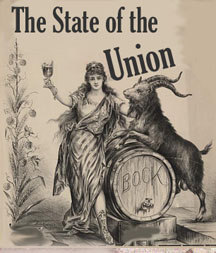I understand the Dow is up a bit today, so maybe we’re not seeing financial Armageddon yet. Time for some evaluation.
The best analogy I can come up with to describe the federal government is as an organ riddled with cancer. And the cancer is the damn supply side trickle down pro-corporation anti-regulation free market ideology liberals gonna gitcha boogaboogabooga crowd that has shouted the rest of us down since 1980.
For too long, their voices drowned out all others in our national political discourse. But for all their bellyaching about elitists and liberals and how badly their opponents ran the government, they never worked out a coherent governing philosophy themselves. As Bill Scher says, the Right’s mantra is less government, lower taxes and a strong military. Those are sales points, not a comprehensive plan for running a country.
With that in mind, let’s look at what’s happened in the past few days.
The utterly corrupt and incompetent Bush Administration has claimed for the past several months that problems in the financial sector were contained. Then, suddenly their hair caught fire, and they proclaimed the financial sector on the brink of ruin and Congress must act now now now now. Then the Administration handed Congress a half-assed proposal that did little more than shovel money in the direction of people who had caused the crisis and give the executive branch more unsupervised power to deal with it.
(I want to add that this is a very familiar pattern. I’ve seen incompetent co-workers and managers do the same thing. It’s a three-step process. One, assure the suits in the executive suites that everything is just fine when it isn’t. Two, when the disaster can no longer be hidden, tell the suits that you can fix everything as long as they give you more time and authority and don’t look too closely at what you’re doing. Finally, if you haven’t already been fired, find another job and dump the mess on someone else.)
A broad consensus quickly formed in Congress that no way were they going to pass the Bush Administration’s proposal as it was. That was a promising sign. So how did it fall apart yesterday?
I’m not a finance whiz, but those who are say that the problem should be fixed through an entirely different approach from the one that the Bushies proposed. See, for example, Joseph Stiglitz:
We could do more with less money. The holes in financial institutions’ balance sheets should be filled in a transparent way. The Scandinavian countries showed the way two decades ago. Warren Buffet showed another way, in providing equity to Goldman Sachs. By issuing preferred shares with warrants (options), one reduces the public’s downside risk and ensures that they participate in some of the upside potential.
This approach is not only proven, but it also provides both the incentives and wherewithal needed for lending to resume. It avoids the hopeless task of trying to value millions of complex mortgages and the even more complex financial products in which they are embedded, and it deals with the “lemons” problem – the government gets stuck with the worst or most overpriced assets. Finally, it can be done far more quickly.
At the same time, several steps can be taken to reduce foreclosures. First, housing can be made more affordable for poor and middle-income Americans by converting the mortgage deduction into a cashable tax credit. The government effectively pays 50% of the mortgage interest and real estate taxes for upper-income Americans, yet does nothing for the poor. Second, bankruptcy reform is needed to allow homeowners to write down the value of their homes and stay in their houses. Third, government could assume part of a mortgage, taking advantage of its lower borrowing costs.
By contrast, US treasury secretary Henry Paulson’s approach is another example of the kind of shell games that got America into its mess. Investment banks and credit rating agencies believed in financial alchemy – the notion that significant value could be created by slicing and dicing securities. The new view is that real value can be created by un-slicing and un-dicing – pulling these assets out of the financial system and turning them over to the government. But that requires overpaying for the assets, benefiting only the banks.
Not all finance gurus may agree with Stiglitz on the Swedish model, but from what I have read a large majority agree that the Administration’s basic approach is deeply flawed.
However, Congress more or less tweaked Paulson’s approach rather than try something completely different. They improved it mightily, according to many. But my understanding is that the smarter people in Congress figured the more conservative members would dismiss the smart approach outright. So instead of the best bill, they put together the best bill they thought they could sell to the right-wing troglodytes in the House.
And it still didn’t pass.
Here’s where the cancer analogy comes in. The organ is being strangled by a malignant mass and is barely functioning. The best proposals are a non-starter because the cancer has to be catered to. But the cancer won’t let a “flawed but better than nothing” bill pass, either.
The House conservatives who sank the bailout didn’t do so because they were listening to loud and angry voices. They sank the plan by accident. They were trying to double-cross the Democrats. First, they wrung lots of concessions out of Democrats at the negotiating table as the price for delivering 80 votes. Then, by not delivering 80 votes and forcing Pelosi to pass the bill as a partisan Democratic bill, they were going to wage a demagogic anti-bailout campaign. But Pelosi refused to be played for a sucker and so the conservative inadvertently sank a bill that, all evidence suggests, they actually wanted to pass. They just wanted to vote “no†on it for short-term political gain.
And, of course, when Pelosi didn’t fall for the trap they complained she had been “partisan.”
Yes, a minority of House Democrats voted with a majority of House Republicans against the proposal. Some Dems did so out of cowardice; they’re in a tight race, and it’s an unpopular bill — more about that in a moment. A few, I understand, voted against it because they wanted a better bill with more protection for taxpayers and homeowners. Noble, but impractical. As Paul Krugman and others say, probably all that can be done now is to patch something together that will keep the economy limping along until a new administration and Congress is sworn in. And pray that will be an Obama administration, because McCain clearly is out of his depth on this issue and will be no better, possibly worse, than Bush.
One of the reasons the bill is unpopular is that there is a colossal vacuum of leadership in Washington, which is another symptom of the cancer. It should fall to the President to explain to people that the consequences of not addressing the financial crisis will cost them more dearly than a “bailout.” However, for all practical purposes we don’t have a functioning POTUS. Now, too late, a large majority of the American people understand that George W. Bush is incompetent and cannot be trusted. So even if he had it in him to deliver an FDR-like address on the crisis, no one would listen to it.
And here we are.


 I don’t want to listen to the creep, mind you, especially since I have yet to recover completely from the flu. But since this is the last State of the Union speech he’s going to give I thought it might have some comic moments.
I don’t want to listen to the creep, mind you, especially since I have yet to recover completely from the flu. But since this is the last State of the Union speech he’s going to give I thought it might have some comic moments.